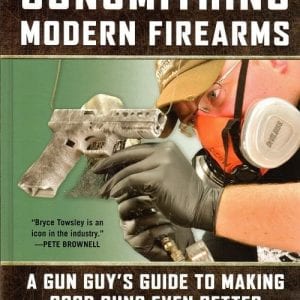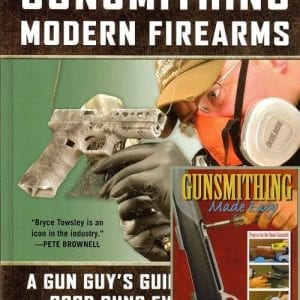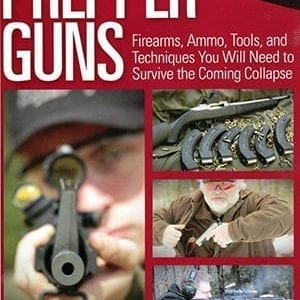The rule is never talk to reporters and it’s a good one to follow. They are never on our side and they are rarely honest. But my thoughts are if we refuse to talk with them, nobody will ever hear our side of the story. So I stuck my neck out and consented to the interview. What the result will be remains to be seen, but I trusted the young lady when she said she wanted to present gun owners fairly. I hope I was not being stupid.
Later, I directed the conversation into other areas as I wanted to get a feel for her, her ethics and her personality. We talked about politics, she was clearly a Hillary supporter, but perhaps I planted a seed of doubt. So she was smart enough to listen, or at least smart enough to pretend to listen. What became clear is that she is young and because she lives in an isolated world in New York City that has influenced her belief system and limited her experience.
The reason this young lady had called me was because of a Harvard study that showed that a small percentage of gun owners have most of the guns. She had bought my book Prepper Guns and asked if I could explain why anybody needed that many guns and asked me how many is too many.
I explained in reasonable terms why somebody might have more than one gun. For example a hunter: he has a shotgun for upland hunting, another for waterfowl, perhaps one for turkey hunting. He probably has a rifle for deer hunting, maybe another for elk and if he hunts dangerous game he has one for that. If he is a gun guy he may have several rifles, as he likes to experiment. Maybe his father was a hunter and he inherited his guns. A competition shooter has even more guns. Look at 3-gun shooting, for example. Clearly you need three guns. If you are serious, you have backups in case one breaks. When technology advances you buy the new gun that everybody is using, but keep the old gun. It all adds up.
I delved into collecting and other aspects of gun ownership. We talked about prepping and the guns for that. Finally I asked her, what does it matter? Does anybody try to limit how many cars a collector like Jay Leno can own? Do they limit how many paintings an art collector can have? My great aunt collected Hummel Figurines; nobody questioned how many is too many of those.
We got a bit sidetracked on why the government wants to limit how many guns a person can own. I concluded that the only reason based on reason, logic and history is because they are scared that person will fight back against their oppression. A free man has nothing he needs to fight, an oppressed man needs the tools to fight his oppressors. It’s nothing to do with crime; criminals use only one gun at a time to commit a crime. It’s about political oppression and keeping the citizens in line. It’s rampant in Europe and some people want to bring it here.
I also noted that the study is flawed and challenged her to investigate some of the numbers they were spouting as “truth.” For example the study said there were 55 million gun owners in America when the accepted number now is 100 million. If they got that so wrong, how can we trust the rest of the study. Will it matter to her? Will she investigate the inconsistencies? We will see, I guess, if she does that. Somehow, I believe she will. Which gives me hope for our future, that some people still care enough to do their job.
The Single Best Survival Tool
In the end we started talking about survival and how she and the rest of the Millennials were not all that well prepared. She started talking about guns and I stopped her.
“Forget about guns for a minute,” I said. “The single best tool you can have to survive is the ability to react fast to changing situations and to solve problems.
“A gun is useless if you have no other skills to survive. If you have nothing, there is nothing to steal from you and so most, not all, other people will leave you alone as you slowly die.”
I asked, “Do you have any idea how to get safe drinking water after it stops flowing out of the faucets? Do you have a clue how you will find food once the restaurants are closed and the grocery store shelves are empty? Do you know any first aid to deal with wounds or injuries? Can you drive a standard transmission? Can you fix anything that is broken?”
We talked about the Millennials and how they lack most of these skills. “In defense of my generation, we do have great skills in other areas,” she said.
I agreed, then I asked how useful any of those skills would be if the electricity stopped flowing.
I got crickets.
Without some life skills and the ability to think under pressure and react quickly to solve problems, you won’t survive a collapse. But just thinking fast is not enough; you need a foundation of knowledge. If you don’t understand how to purify water, you won’t think about alternative sources.
Sure, defense is important. Particularly if you have the other skills. If you have food, water, medical supplies, shelter or transportation, somebody will try to take it away from you. If you have nothing, you have nothing to defend.
It’s a package deal.
I was reminded a few days ago about how helpless many Americans are in modern society. In this case, the guy was from my generation, but in a different lifestyle. The man was late for our meeting because of a flat tire. It happened in a small town and he waited for hours for AAA to come and change the tire rather than change it himself. A fifty-something man who could not change a tire on his Toyota and was not even willing to try. What hope is there for somebody like that in a survival situation?
For the most part if a collapse happens, the millennial generation, and even older people like this guy, will be hit hard. Most will not survive.
Clearly we can’t label an entire generation and there are a few with the brains and the drive to be something more. They will be the survivors.
Learning these skills will never be a bad thing. Even if the world corrects and we go on, which is the most likely scenario, you will have a huge skill set to draw on and build a better life.
Self-reliance is the key to survival. That encompasses many things, but none more than the ability to solve problems.



